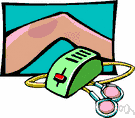stimulus
(redirected from stimuli)Also found in: Thesaurus, Medical, Financial, Encyclopedia.
stim·u·lus
(stĭm′yə-ləs)n. pl. stim·u·li (-lī′)
1. Something causing or regarded as causing a response.
2. An agent, action, or condition that elicits or accelerates a physiological or psychological activity or response.
3.
a. Something that incites or rouses to action; an incentive: "Works which were in themselves poor have often proved a stimulus to the imagination" (W.H. Auden).
b. Government spending designed to generate or increase economic activity.
[Latin, goad.]
American Heritage® Dictionary of the English Language, Fifth Edition. Copyright © 2016 by Houghton Mifflin Harcourt Publishing Company. Published by Houghton Mifflin Harcourt Publishing Company. All rights reserved.
stimulus
(ˈstɪmjʊləs)n, pl -li (-ˌlaɪ; -ˌliː)
1. something that stimulates or acts as an incentive
2. (Physiology) any drug, agent, electrical impulse, or other factor able to cause a response in an organism
3. (Psychology) an object or event that is apprehended by the senses
4. (Pharmacology) med a former name for stimulant
[C17: from Latin: a cattle goad]
Collins English Dictionary – Complete and Unabridged, 12th Edition 2014 © HarperCollins Publishers 1991, 1994, 1998, 2000, 2003, 2006, 2007, 2009, 2011, 2014
stim•u•lus
(ˈstɪm yə ləs)n., pl. -li (-ˌlaɪ)
1. something that incites or quickens action, feeling, thought, etc.
2. something that excites an organism or part to functional activity.
[1605–15; < Latin: a goad, stimulus]
Random House Kernerman Webster's College Dictionary, © 2010 K Dictionaries Ltd. Copyright 2005, 1997, 1991 by Random House, Inc. All rights reserved.
stim·u·lus
(stĭm′yə-ləs) Plural stimuli (stĭm′yə-lī′)
Something that causes a response in a body part or organism. A stimulus may be internal or external. Sense organs, such as the ear, and sensory receptors, such as those in the skin, are sensitive to external stimuli such as sound and touch.
The American Heritage® Student Science Dictionary, Second Edition. Copyright © 2014 by Houghton Mifflin Harcourt Publishing Company. Published by Houghton Mifflin Harcourt Publishing Company. All rights reserved.
stimulus
Any change that evokes a response from an organism.
Dictionary of Unfamiliar Words by Diagram Group Copyright © 2008 by Diagram Visual Information Limited
ThesaurusAntonymsRelated WordsSynonymsLegend:
Switch to new thesaurus
| Noun | 1. |  stimulus - any stimulating information or event; acts to arouse action stimulus - any stimulating information or event; acts to arouse actioninformation - knowledge acquired through study or experience or instruction elicitation, evocation, induction - stimulation that calls up (draws forth) a particular class of behaviors; "the elicitation of his testimony was not easy" kick - the sudden stimulation provided by strong drink (or certain drugs); "a sidecar is a smooth drink but it has a powerful kick" turn-on - something causing excitement or stimulating interest negative stimulation, turnoff - something causing antagonism or loss of interest conditioned stimulus - the stimulus that is the occasion for a conditioned response reinforcer, reinforcing stimulus, reinforcement - (psychology) a stimulus that strengthens or weakens the behavior that produced it discriminative stimulus, cue - a stimulus that provides information about what to do positive stimulus - a stimulus with desirable consequences negative stimulus - a stimulus with undesirable consequences |
Based on WordNet 3.0, Farlex clipart collection. © 2003-2012 Princeton University, Farlex Inc.
stimulus
noun incentive, spur, encouragement, impetus, provocation, inducement, goad, incitement, fillip, shot in the arm (informal), clarion call, geeing-up Falling interest rates could be a stimulus to the economy.
Collins Thesaurus of the English Language – Complete and Unabridged 2nd Edition. 2002 © HarperCollins Publishers 1995, 2002
stimulus
noun1. Something that causes and encourages a given response:
2. Something that incites especially a violent response:
The American Heritage® Roget's Thesaurus. Copyright © 2013, 2014 by Houghton Mifflin Harcourt Publishing Company. Published by Houghton Mifflin Harcourt Publishing Company. All rights reserved.
Translations
باعِث، دافِعمُثير، حافِز
hnací sílapodnět
motivationstimulus
inger
áreiti, ertingörvun, hvatning; drifkraftur
pamudinājumsstimuls
hnacia sila
Collins Spanish Dictionary - Complete and Unabridged 8th Edition 2005 © William Collins Sons & Co. Ltd. 1971, 1988 © HarperCollins Publishers 1992, 1993, 1996, 1997, 2000, 2003, 2005
stimulus
[ˈstɪmjʊləs] [stimuli] [ˈstɪmjʊlaɪ] (pl) n (= encouragement) → stimulant m
(PSYCHOLOGY, PSYCHIATRY) → stimulus m
(BIOLOGY) → stimulus m
Collins English/French Electronic Resource. © HarperCollins Publishers 2005
stimulus
Collins German Dictionary – Complete and Unabridged 7th Edition 2005. © William Collins Sons & Co. Ltd. 1980 © HarperCollins Publishers 1991, 1997, 1999, 2004, 2005, 2007
stimulus
[ˈstɪmjʊləs] n (stimuli (pl)) [ˈstɪmjʊlaɪ] → stimoloit gave trade a new stimulus → ha dato un nuovo impulso al commercio
under the stimulus of → stimolato/a da
Collins Italian Dictionary 1st Edition © HarperCollins Publishers 1995
stimulus
(ˈstimjuləs) – plural ˈstimuli (-liː) – noun1. something that causes a reaction in a living thing. Light is the stimulus that causes a flower to open.
2. something that rouses or encourages a person etc to action or greater effort. Many people think that children need the stimulus of competition to make them work better in school.
Kernerman English Multilingual Dictionary © 2006-2013 K Dictionaries Ltd.
stim·u·lus
n. estímulo, cualquier agente o factor que produce una reacción;
conditioned ___ → ___ condicionado;
subliminal ___ → ___ sublimado.
English-Spanish Medical Dictionary © Farlex 2012
stimulus
n (pl -li) estímuloEnglish-Spanish/Spanish-English Medical Dictionary Copyright © 2006 by The McGraw-Hill Companies, Inc. All rights reserved.